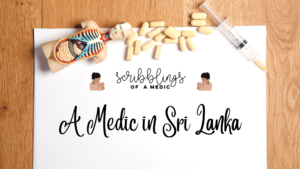Nutrition is a vital part of health management whether you are a fully fledgednutritionist or even a junior doctor, but let’s be honest, in a busy ward we really don’t pay much attention to it. As an intern in the surgical ward I would always order diabetic diets for the diabetics and high protein diet for those that need a little muscle build. In the paediatric ward, I would order lots of high protein diets because that meant the kids would get 2 yoghurts, and what child would not like a yoghurt.

Luckily for me, my best friend is a registered nutritionist and did her masters in nutrition and dietetics. Having her around has really made me realise my lack of knowledge about all things nutrition and what a vital part it is in patient recovery. Read below for her take on being a nutritionist in Colombo!
- Why did you choose nutrition as a career?
HN – So I initially wanted to join an NGO, but I wasn’t a 100% sure on what my role would be. Then someone mentioned about working with vulnerable groups and I realised that nutrition played a huge part in vulnerability. It is also largely neglected subject in Sri Lanka and many groups in Sri Lanka are actually vulnerable due to a lack or unawareness of nutrition. There are some educational programmes currently active in the country to raise awareness, but these are not readily accessible to everybody. This actually sparked my interest in a career in nutrition.
- How does one go about specialising in nutrition?
HN – I first did a Bachelor’s degree in food science and then a master’s degree in dietetics and nutrition. Food science includes food chemistry, functional foods, e.t.c and you study the micronutrients, macronutrients, physiology and basically the chemistry of food. This basically helped me create a greater foundation of what food is and what it does. You learn how food and drugs interact, the science behind food and why we need food in general to survive. In-between this time I did a post graduate course in human nutrition and dietetics from the Colombo Medical faculty to get an understanding of what dietetics is. One thing most people do not know is that dietetics and nutrition are two different things. Nutrition is primarily health and wellness which is talked about in gyms, companies and by NGOS, whilst dietetics is nutrition in a clinical setting which includes therapeutic diets for specialised disease conditions.
- How important is nutrition to patients?
HN – It is extremely important. For example when a patient comes in to hospital their nutrition is affected by their disease condition which may be affecting them both psychologically and physically, putting their bodies into a state of catabolism. Lean body mass is the determinant of a human being’s survival and this is what you need to maintain and build upon. When a patient’s nutritional status is compromised then their recovery is also going to be affected so the chance of a patient being readmitted is greater. Therefore I believe that every single patient should be nutritionally evaluated within 24-48 hours after they are first seen by a physician.
According to the American society of parenteral and enteral nutrition (ASPEN) guidelines, a healthcare professional should evaluate the nutrition status of a patient using a simple questionnaire. There are different assessment tools like the subjective global assessment or the nutrition risk screening tool (2002) where they analyse your dietary intake, the form it is in (i.e. liquid/solid), any symptoms of diarrhoea or vomiting and your functional capacity. This predicts risk of malnutrition based on a scale and then an appropriate intervention can be made.
- What is the current level of nutritional assessment in Sri Lanka?
HN – It is still not a consistently practiced tool and I think all hospitals in Sri Lanka need to put more focus into nutrition. I personally do it for every patient I attend to in the hospital, but that’s still not every single patient who is admitted to the hospital. In Chennai, India where I worked as a part of my master’s degree, all patients who were admitted to the hospital even if it was just for fever would undergo a nutritional assessment by the dietician.
- What do you think medical professionals can do to improve this?
HN – Use a simple nutrition assessment tool which will take you about 5 minutes and can be administered by a doctor or nurse. This can also help doctors build up patients for major surgeries and prevents patients from going into a catabolic state post-surgery. For example, a patient awaiting a liver transplantation will have some time before undergoing transplantation. Nutrition can help build the lean muscle mass of the patient to help them combat the stress of surgery and sometimes nutrition can even bring down some of the biochemical parameters to a state where the patient may not even need a transplant.
- What is a diabetic diet and why is it important?
HN – A diabetic diet is a therapeutic diet used to maintain blood glucose levels – ideally your HbA1C. Meal spacing is very important in diabetic patients to reduce the blood glucose level fluctuating too much. You do not need to stop all carbohydrates in diabetics, you can give your patients a complex carbohydrate. You mainly need to stop the intake of refined sugars in a patient’s diet. Obesity is also a factor that we need to look into if present. A diabetic diet in a hospital will still have red rice, milk rice or even string hoppers, but the quantity will change according to how many calories are required per day for that particularly patient. For a diabetic diet, fibre is very important as it does have control over the blood sugar. So the target would be to include high fibre foods with a low glycemic index.
- What is a low sodium diet and why is it important?
HN – It is exactly what it suggests and should have less than 5g of salt. Hypertensives and those with kidney disease should especially have low sodium diets as well as those at risk of hypertension such as diabetics and those with cardiovascular disease (think metabolic syndrome). Low-sodium solutions can be added whilst cooking, but patients should be advised not to add any additional salt at the table and avoid salted foods (peanuts, dried fish, malted drinks).
- Any other special diets that medical practitioners should know about?
HN – Some other diets would be those relating to renal patients where you would need to know the serum creatinine and the glomerular filtration rate. Patients requiring dialysis need a completely different protein content in their food as does those post-transplant. The potassium levels will also have to be considered in renal patients – renal patients should avoid green leafy vegetables, vegetable soups, bananas, guava, and be encouraged to consume low potassium containing fruits like apples.
Ketogenic diets (higher protein and fat contents) have also used been used for certain epileptic patients who are resistant to treatment.
- Now to more general topics – How important is diet in losing weight as opposed to exercise?
HN – Diet and exercise definitely work hand in hand. I always encourage patients to do exercise – it doesn’t need to be high intensity, but you need exercise atleast 3 days a week. With diet, even if you want to lose weight there needs to be a good balance of protein and carbohydrates because the carbohydrates supply the energy required and you retain the protein so that there would be a protein sparing effect.
- What are your tips to maintain a healthy lifestyle in today’s uber busy world?
HN – Make sure you don’t skip meals. Small frequent meals throughout the day is very beneficial along with drinking a lot of water. Exercise at least 3 times a week for about an hour – even if it’s just a walk.
- Tell me about your blog.
HN – I basically want to educate people about certain topics that are commonly misunderstand and people aren’t aware about. I’ll be talking about nutrition in general – what is important, the latest research/guidelines and how to include exercise into your routine. I’ll also be speaking about diet in different diseases especially as that is the field of medicine I am currently working in right now.
Check out her blog – www.thenutritiousjunkie.wordpress.com for more information on clinical nutrition and dietary advice.
A diet does not just mean losing weight, it means being fit and feeling psychologically better.





